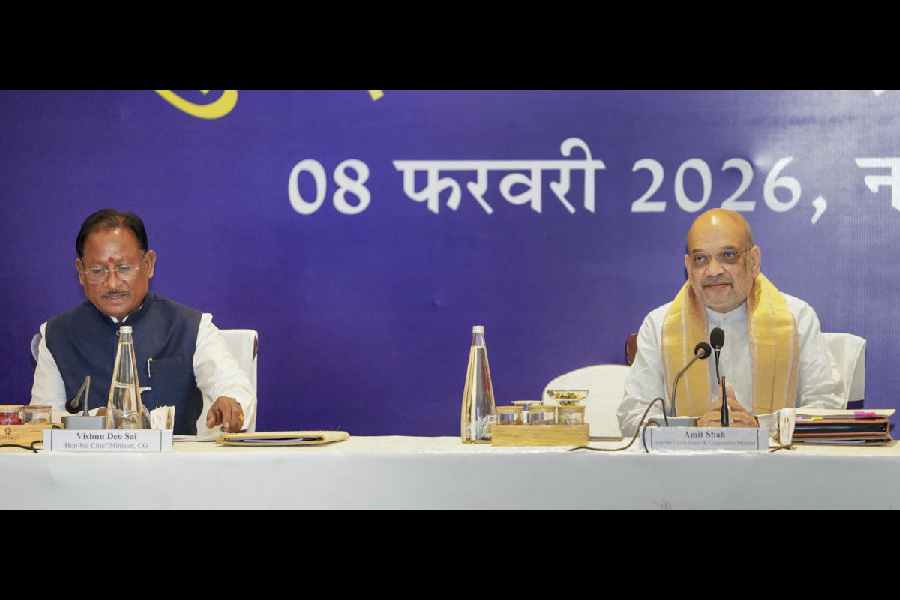 |
Bombay, April, 1871. A band of nervous Parsi musicians is huddled together. It’s their first public performance ever. But members of the Parsi Gayan Uttejak Mandali don’t know that they will touch lives a century and some 40 years later.
Pune, February, 2009. Inside the awe-inspiring 5,50,000-square-foot area of the Ishanya Mall, music history is about to be re-created. A group of Hindustani classical musicians is ready to evoke the memory of the Bombay concert of 1871. Welcome to Baajaa Gaajaa 2009.
The story unfolded at the Turquoise Cottage, one of Delhi’s favourite haunts for rock and roll fans, last week. As Pink Floyd played in the background, several musicians — including classical singer Shubha Mudgal, tabla player Aneesh Pradhan, Rock band Parikrama’s walrus moustachioed keyboardist Subir Malik and Indian Ocean’s pony-tailed bass guitarist and vocalist Rahul Ram — came together at the restaurant-cum-disco to announce India’s first ever music expo.
Musicians from across India will gather in Pune for Baajaa Gaajaa — a three-day festival starting February 6 — to not just celebrate music, but make life easier for musicians.
“What Baajaa Gaajaa would like to do is to become an interactive platform where musicians across genres, independent record labels, craftsmen, art organisations, instrument dealers, students and music lovers can come together, share their experiences, and see if they can form a collective that would work towards the betterment of Indian musicians,” says Shubha Mudgal, whose music label Underscore Records is one of the main organisers of the festival.
One of the highlights this year will be the reconstruction of the Parsi jalsa (concert), held on April 28, 1871. Some of the compositions presented at the jalsa will be performed at Baajaa Gaajaa by leading vocalists from Pune and Mumbai.
The Parsi Gayan Uttejak Mandali, established a year earlier, was one of the earliest formal music clubs in the country set up by Kaikhushro Navrojee Kabrajee (1842-1904), a novelist, playwright and journalist. “Under his leadership, the Mandali encouraged amateur singers from Parsi families to learn music from well-known musicians on its staff and to present public concerts,” says Aneesh Pradhan. “This was a major departure from the norm — classical music during this period was learnt and performed by those coming from musician families.”
The event, to be inaugurated by poet and lyricist Gulzar, will feature performances, exhibitions, trade shows, seminars, workshops and film screenings on Indian music. It will have performances by Carnatic vocalist Dr Balamuralikrishna, santoor maestro Pandit Shivkumar Sharma and vocalist Uday Bhawalkar, among many others.
But, clearly, it’s not going to be just fun and frolic. There is a theme running through the festival — and that’s an attempt to combat what the musicians believe are big music companies’ grasping hold over the music industry.
“Baajaa Gaajaa focuses on both the diversity of Indian music, and the relatively unrecognised contribution of independent record labels that ensure this diversity is not completely throttled. Sadly, the diversity continues to be neglected by the mainstream music industry,” says Mudgal.
So it’s not surprising that the three days will include an array of discussions aimed at spreading awareness on the nitty gritty of making music. Topics for discussions include intellectual property rights, contracts with music labels, royalties, the role of an agent and so on. Attempts, clearly, are on to ensure that budding artistes, or even the veterans, don’t get taken for a ride.
Urban folk singer Susmit Bose welcomes the expo — for when he released his first album Winter Baby in 1973, he was like putty in the hands of his producers. “When you’re starting out, there’s little elbow room for negotiation with labels. Music labels want to make money more than build a music culture,” he says.
Vocalist Raghu Dixit of The Raghu Dixit Project says, “Musicians are all heart and no brains … When you sign on the dotted line with a big label, you become a slave to the recording company,” he says. One of the founder members of Indian Ocean, Susmit Sen, rues that the band has no rights over their first album (Indian Ocean — 1992) apart from three songs which were live per- formances.
The musicians hope the expo will help them know more about music and also understand the dynamics of the trade. Parikrama’s Subir Malik, for one, wants to know everything about how to keep the cash registers ringing. “Let’s face it, if you have to make it as an artist you have to wise up about the works. Most musicians are idiots when it comes to the business side of things. This attitude needs to change and Baajaa Gaajaa aims to do that,” Malik believes.
Music labels, understandably, have a different take. “We’re not against so-called ‘independent music’. If there’s a market for it, then why not promote it?” says Rajeeta Hemwani, vice-president, artists & repertoire, Universal Music, India.
Arjun Sankalia, associate director, Sony BMG, doesn’t want all established music labels to be painted with the same brush. “We deal with musicians and bands on a case-to-case basis. No one experience compares with the other,” he says. As for what the expo sets out to do, and its possible impact on labels, Sankalia is non-committal.
But for the music lovers, the festival promises to be a mega event. They are going to listen to sufi, rock, jazz and classical music, and watch films and archival exhibitions. And, every now and then, they will discuss business.










